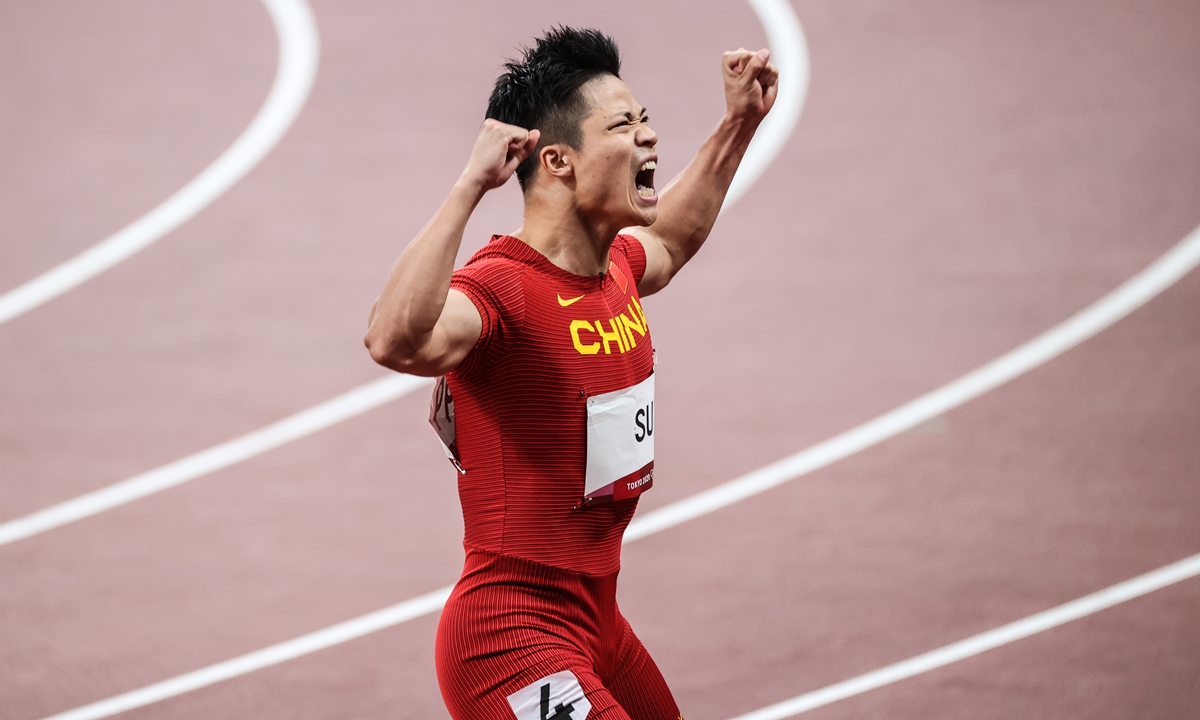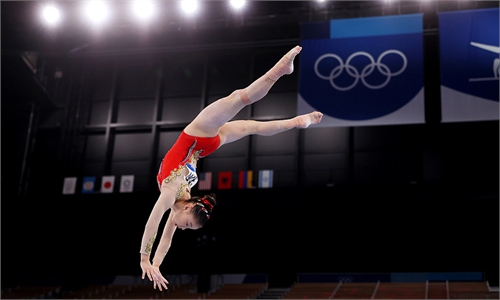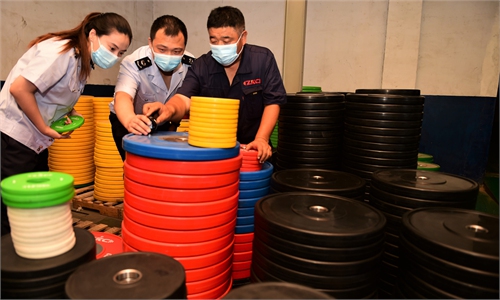
Chinese sprinter Su Bingtian celebrates after the men's 100 meters semifinal during the Tokyo Olympic Games on Sunday. Photo: IC
"The 9.83-second finish was an extraordinary performance to me," commented Chinese sprinter Su Bingtian on his record-breaking semifinal finish of men's 100 meters sprint at the Tokyo Games on Sunday.
The Chinese athlete, who turns 32 in late August, outdid himself to set the new Asian record for the event with a 0.9-meter-per-second speed. Su finished the final in 9.98 seconds, notwithstanding he was the sixth in the eight-man race.
"I wasn't really thinking about getting a medal. Being defeated by the top five was no regret for me," Su told media.
The sprinter also expressed that he already had lived out his dream by getting into the final round and break the "10-second barrier."
However, the Olympic journey is not quite finished for Su, and he is still gearing up for the men's 4x100 meters relay on Thursday with his relay teammates including China's promising 200 meters runner Xie Zhenye, who became the first Chinese to reach the semifinal of the competition.
As rival as friend
"Brother Xiang is not only my idol, but also maybe is my lucky star." That's the words how Su describes China's track trailblazer Liu Xiang, a former 110 meters hurdler who won gold at the 2004 Athens Games - the first Chinese to win top prize at Olympic track events.
"I'm always keeping in touch with him, and he is always encouraging and supporting me… He witnessed the first time that I made the '10 seconds breakthrough' in person," Su said.
Liu was also one of those fans who just couldn't contain his happiness after seeing Su performed phenomenally in the semifinal.
"Godlike! 9.83!!" posted Liu after Su's semifinal, adding another comments, "Everyone please lend him some luck for the finals."
The two track stars have not just been bonded by emotion. Liu has also been a "strategic exemplar" to Su that inspired him to make a risky decision in 2014 - to change his starting foot from his right to his left.
"In fact, I have also referred to Liu Xiang's 'Eight-to-Seven' strategy (8-step stride to the 7-step) when I changed my starting foot. I think top-level athletes like him can make it, why shouldn't I give it a try. Even if it is unsuccessful, the results won't be terrible. I have thought about it."
Liu is not the only figure to leave a positive impact on Su's running career, his peer including Zhang Peimeng also made him stronger by providing strong competition.
"He [Zhang Peimeng] and I are belonging to the same era; we compete constantly, that made who I am today."
The athletes are considered to be at the pinnacle of Chinese sprint athletics.
Zhang made his debut earlier than Su and Xie, and was recognized as Chinese 100 meters sprint's trailblazer - the first Chinese male to set foot on the 100 meters in 10 seconds at the 2013 World Athletics Championships.
But before his success, he was alarmed by Su's breakthrough in 2011, when he broke the national men's 100 meters record to clock 10.16 seconds. In 2012, Su made more progress in Japan by finishing his run in 10.04 seconds.
"I remember Zhang said to me that one of the things that impressed him a lot about me was when I was racing in Japan in 2012. He was there to watch me run 100 meters, and I ran 10.04 seconds, which shocked him a lot," recalled Su.
This friendly rivalry made Su even more determined to pursue his running career despite at one point being on the verge of giving it up.
By experiencing rough patch of form, Su did consider retiring when he got an attractive offer by Jinan University to be a teacher in 2014.
However, the 2015 Diamond League ignited his passion again as he finished his game in record breaking 9.99 seconds.
He then bounced back seeking new breakthroughs in the Rio Games as well as 2017's National Games, while also embarking on his journey as an educator.
Flying man's happy life
Su has become an associate professor at Jinan University in 2018, where he received his bachelor's and master's degree. His personal story is a source of valuable teaching materials.
One of Su's papers has gone viral on China's Twitter-like Sina Weibo.
In the research paper, Su took himself as subject of the research to analyze China's 100-meter male sprint, recording how he improved his speed.
Su's happy family and close relation with his wife have come to be admired by lots of netizens.
"From uniforms to wedding suits" is used to describe Su's marriage on social media to display the long-standing romantic relation.
He and his wife Lin Yanfang fell in love at school and in October 2017, they decided to get married.
What builds a flying man
Su does not have an advantage when it comes to age. Those who compete with him on the same course are mostly in their 20s and even much younger - Yan Haibin, a young man in the national team who was born in 2003 - but Su defeated the time by his self-discipline and running skills.
Su's families and teammates told the media that he has never smoked or consumed alcohol, and must sleep at 10 pm every day to maintain his physical condition.
Su's coach helped him to set a special training plan. Some of his issues his support team identified included improper starting stance, poor breathing and pacing technique.
The training plan targeted these problems and made a big difference in lifting Su's speed.
As an educator, Su looks forward to helping young Chinese sprinters develop, acting as a mentor. He believes that even if he did not achieve the 9.83 seconds record, this dream can still come true when he helps the young runners in his retirement.
"Let the young generation to step on my shoulder to achieve the goal," Su said.



